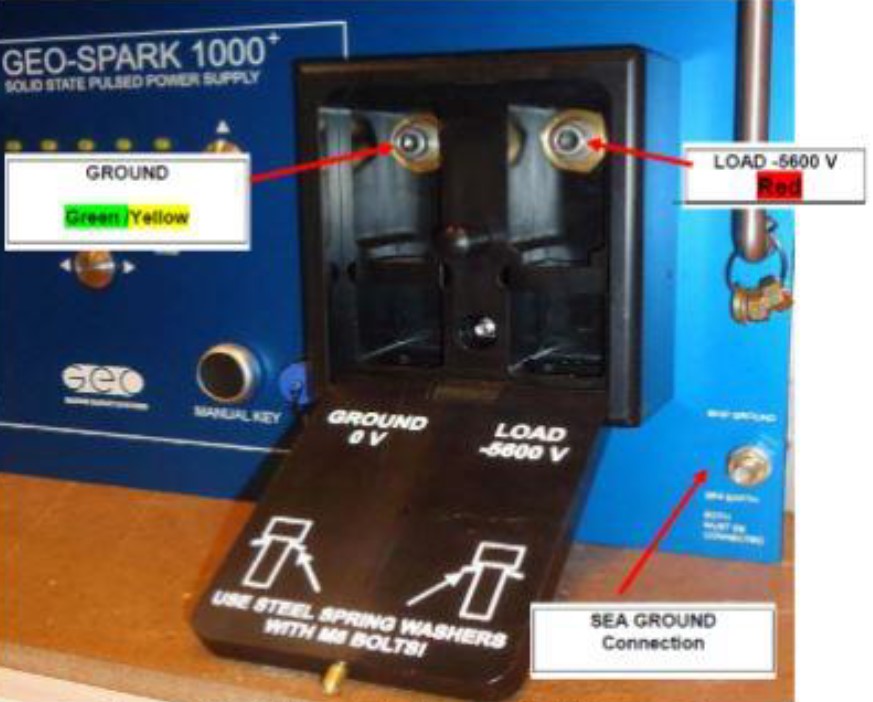- IP Code: Mandatory Code enters into force on 1 July. Make sure your company is up to speed with the changes.
- Early Bird tickets available for the IMCA Global Summit 2024. 3-4 December, Utrecht, Netherlands. Members can save £400.
- Discover how we are helping Members reduce emissions: Explore the ProjectGHG hub now.
- Now booking. Join the Lifting and Rigging community at our Technical Seminar in Amsterdam. Thursday 12 September 2024
- Now booking. Underwater Ship Husbandry Seminar. 10 October 2024, Singapore.
Fault in high voltage equipment
What happened
A serious fault was discovered in high voltage (-5600 V) equipment; the fault caused sparks to be observed across the high voltage terminals. Portable seismic survey “sparker” equipment was mobilised on a vessel. During initial tests of equipment, a spark was observed on the -5600 V High voltage terminals.
The issue was not reported to the bridge, nor was a near miss or incident report submitted. There was a delay of four weeks between when the incident happened and when it was officially reported.

What were the causes?
Preliminary investigation revealed that:
- This issue presents if the terminals are loose. They were tightened but the issue persisted;
- The incorrect washer type was used on the high voltage terminals. The manufacturer recommends conical spring washers. Standard split spring washers were used instead on the terminals. Also, a specific brass flat washer is recommended by manufacturer;
- After servicing by the manufacturer and feeding back the details of the fault observed, the manufacturer confirmed the bolts on the high voltage terminals were not threaded all the way to base of bolt. As a result, if incorrect thickness washers were being used this would not allow the terminals to be fully tightened;
- Three days had been planned for training. Owing to delays caused by poor weather only three hours was available for training – there was perceived pressure to get the job done in a rushed way.
Recommendations
- Ensure crew working with high voltage systems are trained and competent to work on the respective type of system;
- Ensure crew are familiar with risk assessments and safe systems of work for the type of equipment they are working with;
- When a safety issue presents on a high voltage system “STOP WORK”, isolate the power and report it to the appropriate authority;
- Report and investigate in a timely way: the delay in reporting this incident led to issues during the investigation. Crew could not remember the detail due to extended period of time. Immediate investigation post-incident is extremely important to ensure accurate information can be collated on what happened from all witnesses.
Members may wish to refer to:
- Are you prepared to work safely? Short video on electrical hazards
- Short circuit on 440v AC bus bars – arc flash [incident also not reported in a correct or timely way]
- IMCA HSSE 016 Guidance on the investigation and reporting of incidents
- IMCA HSSE 031 M 217 Offshore vessel high voltage safety
- IMCA R 005 Guidance on safety procedures for isolation of ROV high voltage equipment (above 1㎸)
- IMCA C 010 High voltage training: A syllabus for training offshore workers involved with high voltage equipment
Safety Event
Published: 30 July 2021
Download: IMCA SF 21/21
IMCA Safety Flashes
Submit a Report
IMCA Safety Flashes summarise key safety matters and incidents, allowing lessons to be more easily learnt for the benefit of all. The effectiveness of the IMCA Safety Flash system depends on Members sharing information and so avoiding repeat incidents. Please consider adding [email protected] to your internal distribution list for safety alerts or manually submitting information on incidents you consider may be relevant. All information is anonymised or sanitised, as appropriate.
IMCA’s store terms and conditions (https://www.imca-int.com/legal-notices/terms/) apply to all downloads from IMCA’s website, including this document.
IMCA makes every effort to ensure the accuracy and reliability of the data contained in the documents it publishes, but IMCA shall not be liable for any guidance and/or recommendation and/or statement herein contained. The information contained in this document does not fulfil or replace any individual’s or Member's legal, regulatory or other duties or obligations in respect of their operations. Individuals and Members remain solely responsible for the safe, lawful and proper conduct of their operations.
